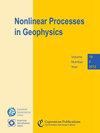Control simulation experiment with Lorenz's butterfly attractor
IF 2.4
4区 地球科学
Q3 GEOSCIENCES, MULTIDISCIPLINARY
引用次数: 2
Abstract
Abstract. In numerical weather prediction (NWP), sensitivity to initial conditions brings chaotic behaviors and an intrinsic limit to predictability, but it also implies an effective control in which a small control signal grows rapidly to make a substantial difference. The Observing Systems Simulation Experiment (OSSE) is a well-known approach to study predictability, where “nature” is synthesized by an independent NWP model run. In this study, we extend the OSSE and design the control simulation experiment (CSE), where we apply a small signal to control “nature”. Idealized experiments with the Lorenz-63 three-variable system show that we can control “nature” to stay in a chosen regime without shifting to the other, i.e., in a chosen wing of Lorenz's butterfly attractor, by adding small perturbations to “nature”. Using longer-lead-time forecasts, we achieve more effective control with a perturbation size of less than only 3 % of the observation error. We anticipate our idealized CSE to be a starting point for a realistic CSE using the real-world NWP systems, toward possible future applications to reduce weather disaster risks. The CSE may be applied to other chaotic systems beyond NWP.洛伦兹蝴蝶吸引子控制仿真实验
摘要在数值天气预报(NWP)中,对初始条件的敏感性带来了混沌行为和固有的可预测性限制,但它也意味着一种有效的控制,在这种控制中,一个小的控制信号迅速增长,从而产生实质性的差异。观测系统模拟实验(OSSE)是研究可预测性的一种众所周知的方法,其中“自然”是由独立的NWP模型运行合成的。在本研究中,我们扩展了OSSE并设计了控制仿真实验(CSE),其中我们应用小信号来控制“自然”。Lorenz-63三变量系统的理想实验表明,我们可以控制“自然”保持在一个选定的状态,而不转移到另一个状态,即,在洛伦兹蝴蝶吸引子的一个选定的翅膀上,通过向“自然”添加小的扰动。利用较长的预估时间,我们实现了更有效的控制,孔径大小小于观测误差的3%。我们希望我们的理想CSE能够成为现实CSE的起点,使用现实世界的NWP系统,走向未来可能的应用,以减少天气灾害风险。CSE可以应用于NWP以外的其他混沌系统。
本文章由计算机程序翻译,如有差异,请以英文原文为准。
求助全文
约1分钟内获得全文
求助全文
来源期刊

Nonlinear Processes in Geophysics
地学-地球化学与地球物理
CiteScore
4.00
自引率
0.00%
发文量
21
审稿时长
6-12 weeks
期刊介绍:
Nonlinear Processes in Geophysics (NPG) is an international, inter-/trans-disciplinary, non-profit journal devoted to breaking the deadlocks often faced by standard approaches in Earth and space sciences. It therefore solicits disruptive and innovative concepts and methodologies, as well as original applications of these to address the ubiquitous complexity in geoscience systems, and in interacting social and biological systems. Such systems are nonlinear, with responses strongly non-proportional to perturbations, and show an associated extreme variability across scales.
 求助内容:
求助内容: 应助结果提醒方式:
应助结果提醒方式:


